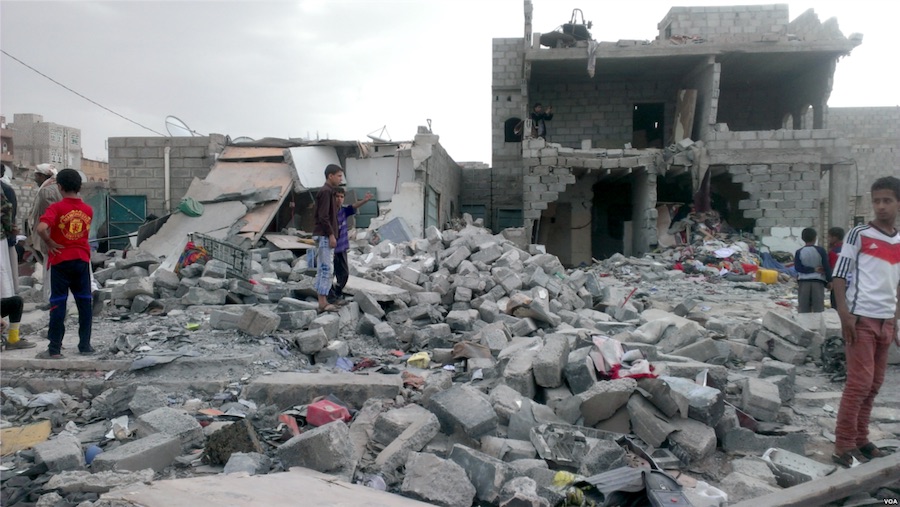Yemen After a Saudi Withdrawal: How Much Would Change?
Pressure is mounting on Saudi Arabia to pull out of Yemen. The Pentagon announced on Nov. 9 that it would stop aerial refueling of Saudi planes conducting operations in Yemen, ending assistance that began under President Obama in 2015, when Riyadh first began its bombing campaign.

Published by The Lawfare Institute
in Cooperation With

Pressure is mounting on Saudi Arabia to pull out of Yemen. The Pentagon announced on Nov. 9 that it would stop aerial refueling of Saudi planes conducting operations in Yemen, ending assistance that began under President Obama in 2015, when Riyadh first began its bombing campaign. Last week, the Senate broke with the White House voted 63 to 37 to advance a resolution to end U.S. military support for the Saudi-led war. Democrats in the House of Representatives have promised to use their impending majority to end U.S. support for the Saudi war. So far, the president himself remains unconvinced and loyal to his Saudi friends, but Secretary of State Mike Pompeo and Secretary of Defense James Mattis both called for a ceasefire, suggesting the administration position on the Yemen war may be softening.
The Saudi campaign has been an unmitigated disaster for Yemen, transforming the country’s civil war from bad to horrific. Yemen’s humanitarian crisis is the worst in the world, with hundreds of thousand already dead and millions at risk of disease and starvation. Although Riyadh did stop the Iran-supported Houthi rebels from consolidating power, the Houthis have hung on and still control much of the country.
An end to the Saudi intervention is long overdue—but even if it occurs, don’t expect Yemen’s nightmare to draw to a close. For a change in Saudi policy to have the most impact, it must be coupled with a broader pullout of foreign powers and a ceasefire among Yemen’s many warring factions.
By itself, an end to the Saudi bombing campaign and blockade would be a milestone. The air strikes have killed thousands of Yemenis, including many children. The bombing also destroyed much of Yemen’s already-tottering infrastructure, making medical care and food distribution even more difficult. Less visibly, but more deadly, the Saudi blockade of many of Yemen’s ports and airport—done in the name of stopping Iranian arms from entering Yemen— has prevented food and humanitarian aid from entering the country as well. This has contributed to the massive famine.
Strategically, a close to the Saudi intervention would also benefit a key U.S. ally in the region—Saudi Arabia. Riyadh justified its intervention as a way to counter Iran, fight terrorism and restore a stable government in Yemen. But terrorists remain active in Yemen, and stability is farther off than ever. The Saudi-backed president of Yemen, Abdrabbuh Mansur Hadi, has no power base and little popular support. Perhaps most important from Riyadh’s point of view, Iran’s position in Yemen is stronger than ever. The war has increased the Houthis’ dependence on Iran for arms and financial support. In addition, the court of world opinion has come to see Saudi Arabia, not Iran, as the aggressor in the conflict, and it is Saudi Arabia whose reputation is damaged by the ongoing disaster there.
Yet even if Saudi Arabia comes to its senses or is compelled to do so, an end to the intervention would only be the beginning of what is needed. The United Arab Emirates (UAE) would still be militarily involved in the fighting against the Houthis, and it is a much more active player than Saudi Arabia on the ground in Yemen. Local actors would continue to fight: The country is highly divided, and the main factions themselves are further divided. Yemen today is a failed state, and there is no accepted political leadership to pick up the pieces. The Houthis, Iran’s ally, would be the strongest of the factions, and they are brutal and authoritarian as well as tied to Tehran. Terrorist groups like al-Qaeda in the Arabian Peninsula would remain active, trying to establish themselves in any areas that lack a strong rival. Perhaps most important from Riyadh’s point of view, Tehran can claim a victory over its long-time rival. Although Houthi reliance on Iran would decrease as well, the alliance is likely to endure, and Iran will have influence on yet another of Saudi Arabia’s borders. Crown Prince Mohammad bin Salman, who championed the Yemen war, would be admitting his intervention failed.
To improve both the strategic and humanitarian situation, any decrease in the Saudi military campaign must become the impetus for broader measures to end the war and decrease the suffering. Most important, Iran and the UAE should also be pressed to end their involvement. Yemen’s fires won’t be extinguished if outsiders no longer fuel them, but they will diminish. Hoping to seize the moment, U.N. envoy Martin Griffiths is currently trying to arrange a ceasefire and ensure the key Yemeni port of Hodeidah is open for international aid to enter the country. Griffiths is also fostering a broader dialogue, and key parties to the conflict are expressing a willingness to negotiate— a willingness that might grow if Riyadh moves to end its bombing campaign and other forms of intervention.
The United States should continue to offer Saudi Arabia assistance with its territorial defense from any Houthi missiles. In addition, the Saudis are more credibly able to hold Iran responsible for Houthi missile attacks on the Kingdom after a withdrawal if Washington is behind them, so U.S. support for deterrence is vital. Because terrorist groups remain a concern, the United States must also continue counterterrorism operations in Yemen. All this must be supplemented by a rapid and massive humanitarian effort to move Yemenis away from the brink of starvation. An end to the Saudi intervention is a good first step to ending this suffering, but by itself it will not be enough.





